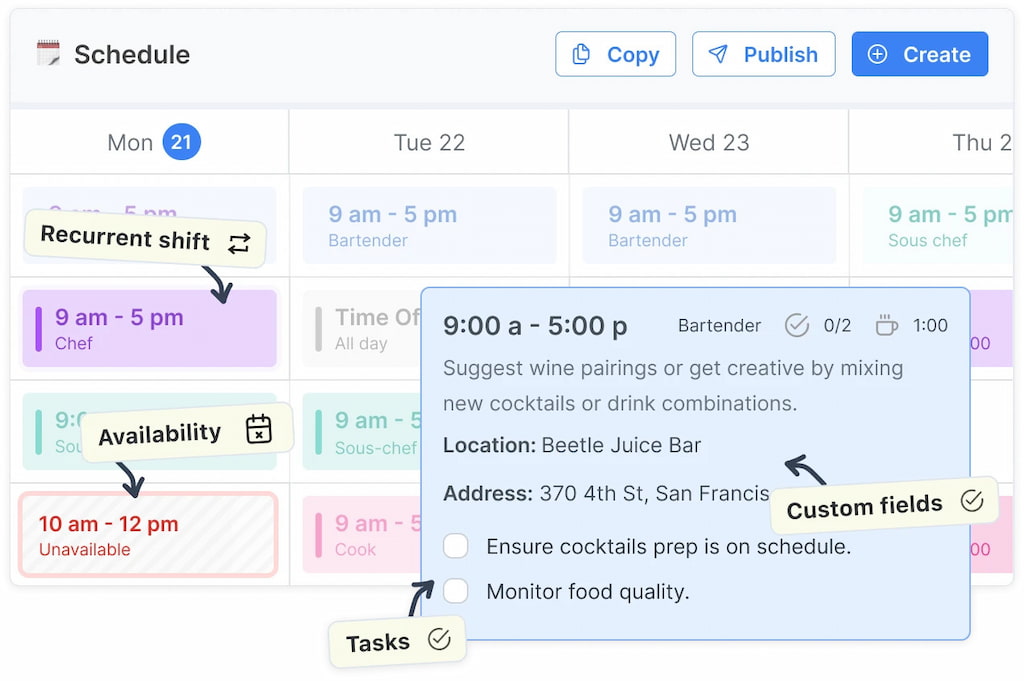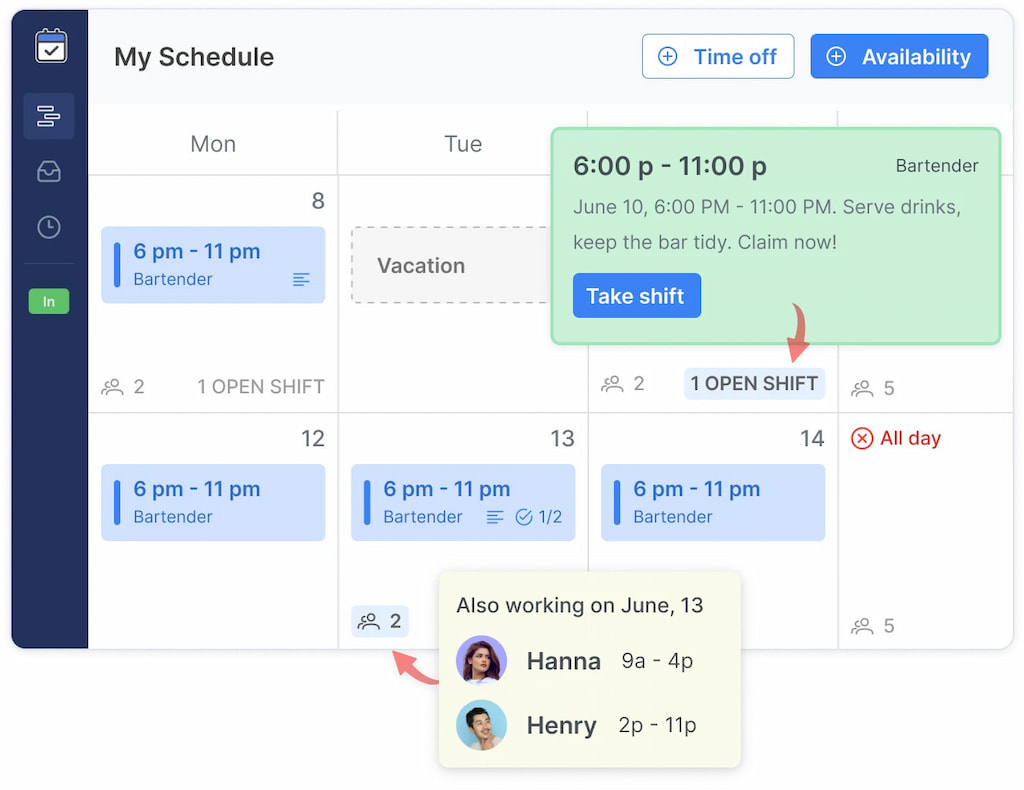Picture this: It’s Friday night at your café, and you realize two baristas didn’t show up. One swapped shifts via text, the other thought their day off was approved. The result? Chaos, overtime, and frustrated customers. Managing hourly workers shouldn’t feel like a guessing game—especially now, when AI-powered tools can predict, plan, and automate most of it for you.
This article breaks down how intelligent scheduling for hourly workers works, why it matters more than ever, and how tools like Shifts by Everhour use automation and real-time data to make staff scheduling smarter, faster, and fairer.
🧠 What Is Intelligent Scheduling?
Intelligent scheduling uses automation, predictive analytics, and machine learning to assign work shifts based on real-world data—availability, workload, labor costs, and compliance rules—rather than human guesswork. Instead of manually creating weekly rotas or reacting to no-shows, intelligent scheduling systems:
- ⚡ Forecast demand: Use past trends and sales patterns to plan ahead
- 🧩 Match skills & availability: Assign the right person to the right shift
- 📣 Instant notifications: Real-time alerts for changes or reassignments
- ✅ Compliance check: Spot overtime or missed breaks before they happen
- 📊 Continuous learning: Historical data improves every week’s schedule
Companies using intelligent scheduling report up to 25% lower labor costs and 30% fewer missed shifts compared to manual planning.
⚠️ Why It Matters
Hourly labor is increasingly dynamic—think restaurants, healthcare, construction, retail, logistics. Workers expect flexibility, while employers need predictability. Intelligent scheduling bridges that gap. Now:
- AI models analyze real-time data from POS, CRM, or IoT devices to predict staffing needs hour by hour.
- Shift apps sync with calendars, ensuring no overlap or confusion.
- Labor laws are getting stricter globally, and intelligent scheduling helps maintain compliance automatically.
- Employee satisfaction rises when scheduling becomes transparent and self-service.
Manual scheduling isn’t just outdated—it’s expensive. Time spent redoing rosters or dealing with absenteeism is time stolen from operations.
🔨 Key Features of Intelligent Scheduling Systems
- 📊 Predictive workforce planning: Forecast staffing needs using historical data, seasonal demand, and weather patterns (e.g., retail rushes or delivery surges)
- ⚡ Smart shift allocation: Automatically assign shifts based on skills, availability, and seniority to reduce bias
- 📱 Automated alerts & real-time adjustments: Instantly suggest replacements or notify available staff if someone calls in sick
- ⚖️ Compliance & overtime guardrails: Enforce maximum work hours, breaks, and labor laws automatically
- 🙋 Self-service employee portals: Allow requests, shift swaps, and schedule confirmations via mobile apps
- 📈 Data-driven insights: Track attendance trends, performance gaps, and labor costs per department for smarter staffing
👀 How Shifts by Everhour Redefines Workforce Scheduling
When managing hourly teams, most companies still juggle spreadsheets, text threads, and clunky HR systems. Shifts by Everhour changes that. Here’s how it simplifies scheduling and visibility:
- Drag-and-drop scheduling: Build, adjust, and publish schedules in minutes.

- Time tracking integration: Compare planned vs. actual hours automatically.
- Smart notifications: Remind employees of upcoming shifts or changes.
- Open shift marketplace: Workers can claim open shifts, reducing coverage gaps.

- Compliance-safe rules: Built-in logic prevents overscheduling or missed rest hours.
- Analytics dashboard: Visualize labor costs, coverage, and trends across locations.
Unlike many single-purpose apps, Shifts integrates directly with Everhour, giving you unified time tracking, scheduling, and reporting in one system. This eliminates data silos and ensures accountability from scheduling to payroll.
💡 Real-World Use Cases
Hospitality
Restaurants use intelligent scheduling to balance busy weekends vs. slower weekdays. The system learns from reservation data to optimize shift counts and avoid overtime.
Retail
Stores predict customer footfall via sales history, aligning staff levels with traffic patterns for better coverage. Check out our breakdown of the best retail scheduling practices.
Healthcare
Clinics automate nurse rotations based on patient volume, skills, and certifications—reducing fatigue and errors.
Construction
Project managers allocate workers by skill and site, tracking attendance and weather-driven downtime in real-time.
🔎 Best Practices for Implementing Intelligent Scheduling
- 🌱 Start small: Begin with one department or location before scaling across teams
- 🔗 Integrate your systems: Connect scheduling with time tracking, payroll, and HR for full visibility
- 📱 Empower staff: Let employees manage shifts through mobile self-service tools
- 📈 Analyze weekly: Use labor cost and attendance reports to refine scheduling rules
- ⏰ Automate notifications: Push reminders to reduce no-shows
- ⚖️ Stay compliant: Embed local labor laws into scheduling logic from the start
☝️ Comparison Table: Top Intelligent Scheduling Tools for Hourly Teams
| Tool | Key Features | Pricing/Plan | Ideal For |
|---|---|---|---|
| Shifts by Everhour | Drag-and-drop scheduling; open shifts & swaps; built-in time tracking; compliance guardrails; mobile alerts | Free & paid plans | Businesses that need unified scheduling + time tracking |
| Deputy | AI-based shift planning; labor forecasting; compliance automation; attendance tracking | Paid plans | Retail and hospitality teams with fluctuating demand |
| When I Work | Auto scheduling; employee availability; shift swapping; mobile reminders | Free & paid plans | Small to midsize teams seeking simple automation |
| 7shifts | Labor optimization; restaurant-specific analytics; team chat; POS integration | Paid plans | Restaurant and food service operations |
| Homebase | Scheduling; time clock; payroll sync; hiring tools; staff chat | Free & paid plans | Small businesses managing hourly retail or service workers |
| Connecteam | Shift management; team communication; task tracking; mobile training | Free & paid tiers | Deskless teams and field workers |
| HotSchedules | Forecasting; shift trade; multi-location management; reporting | Paid plans | Hospitality chains and enterprise operations |
| ZoomShift | Availability management; team messaging; shift reminders; labor reports | Paid plans | Local businesses wanting lightweight scheduling tools |
| Shiftboard | Demand forecasting; labor compliance; union rule management; mobile scheduling | Enterprise licensing | Large enterprises or industrial workforces |
Tool highlights
- Shifts by Everhour: Ideal for unified scheduling and time visibility.
- Deputy: Excels at compliance-heavy, high-volume scheduling.
- When I Work: Perfect for smaller teams upgrading from spreadsheets.
- 7shifts: Focused on restaurants and hospitality analytics.
- Homebase: Great free starter option for SMBs.
❓ FAQ: Intelligent Scheduling for Hourly Workers
What is intelligent scheduling?
It’s automated scheduling that uses AI and analytics to match labor demand with workforce availability, improving efficiency and fairness.
Is AI scheduling replacing managers?
No—AI assists managers by handling repetitive scheduling tasks, letting them focus on leadership and performance.
Can employees control their shifts?
Yes, most intelligent scheduling tools offer self-service dashboards for swaps, requests, and confirmations.
How does it reduce labor costs?
By optimizing staffing to real demand, preventing overstaffing, and reducing unnecessary overtime.
What’s the difference between scheduling and time tracking?
Scheduling plans who works when; time tracking records what actually happened. Tools like Shifts by Everhour merge both for complete accuracy.
🔚 Final Thoughts: Intelligent Scheduling for Hourly Workers
Intelligent scheduling for hourly workers isn’t about replacing human intuition—it’s about enhancing it with data and automation. For hourly workers, it means fairer schedules and fewer last-minute surprises. For businesses, it means optimized coverage, reduced costs, and happier teams.
If managing shifts or tracking time still feels like a daily scramble, it’s time to modernize. Shifts by Everhour brings clarity, automation, and accountability to your workforce—so your next schedule practically writes itself.
Get started with a pilot, measure the improvements, and let Shifts by Everhour help you scale without chaos. The future of hourly team management is smart, simple, and structured. Why wait?
If you’re looking for a seamless way to improve shift planning, Shifts by Everhour is the perfect event staff scheduling software. With features like real-time monitoring, easy scheduling, and mobile accessibility, managing your workforce has never been simpler with top scheduling apps for work.
Ditch the spreadsheet mess and streamline your time-off workflow.
Check out the best employee roster software to make sure every minute is counted!

